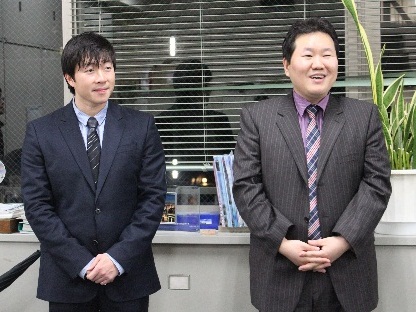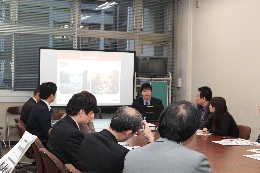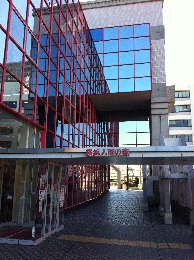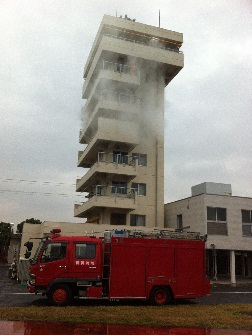Main content starts here.
Staff Exchange
Last updated date:2018/9/28
Staff Exchange
Let me start this update by wishing everyone a happy new year! I hope 2013 is full of wonderful developments for each and every one of you! I realize I haven’t updated the title banner in a while. I’ll take it as a sign that my life is satisfyingly busy. But I’ll try to come up with something soon.
Today, I want to bring up an initiative the City of Yokohama has been putting quite a lot of efforts into in recent years, i.e. the exchange of staff with other cities around the world.
In 2009, Incheon Metropolitan City(外部サイト), Republic of Korea, and Yokohama entered into a partner-city agreement. Two years later, in 2011, the Mayor of Yokohama visited the Republic of Korea and promoted the city’s attractiveness to invite people to Yokohama. She met with the mayors of Incheon and Seoul Metropolitan City(外部サイト), both of which have a history of exchange with Yokohama through both one-to-one initiatives and the CITYNET network.
This led to the establishment of a staff exchange project with each city. The actual exchange of employees started in March 2012 with Incheon and October 2012 with Seoul. Following the dispatch of two Yokohama officials to Incheon and Seoul respectively – one went to Seoul to study environmental policies and the other, to Incheon to study creative city policies – it was Yokohama’s turn to welcome an official from each city. And so, in November 2012, we welcomed two Korean public servants at City Hall who were to work with us for one month. Let me introduce our two new friends.

Hung Hoon Jung
Hung Hoon was the first to arrive. Coming from the Child Care Division, Seoul Metropolitan Government(外部サイト), he says one of the reasons he applied on the exchange, besides learning about child care policies, was to put his study of Japanese to use through work. He had wanted to visit Japan before, but hadn’t had the opportunity for various personal reasons. He has been to Canada, though, so I’m satisfied! He has mainly been practicing Japanese by watching Japanese dramas and movies.
Before coming to Yokohama, all he knew of the city was its name and that it was a port city. In the month he worked here, he discovered much more than a port. His favorite place is Isezakicho and the atmosphere of its shopping street. He also found he liked the kindness of Japanese shop keepers, which he says are very different from those in South Korea. One of the things Hung Hoon appreciates the most whenever he travels is the night view of cities such as what can be seen in Seoul, Taiwan or Vancouver. He says was more than pleased with Yokohama, such as with the view from Osanbashi.
Since his work in Seoul has to do with child care, he naturally spent some time in Yokohama learning about child care policies. He visited many international organizations based in Yokohama, such as ITTO, CITYNET and YOKE, but also a language lounge (which I have talked about before here and here), a nursery and other academic facilities where he had some time to play with the kids.

Suk Hwan Jung
Suk Hwan came from the Incheon Fire Academy, Incheon Metropolitan City(外部サイト). His work involves emergency rescues, the training of firefighters, etc.
He started getting interested in Japanese through video games such as Dragon Quest when he was in elementary school. Unfortunately, there were few Japanese classes at his school. It’s really from high school that he began to soak in Japanese-ness. He got immersed in Japanese manga, anime and TV shows. In Incheon he participated in and won various Japanese speech contests, took proficiency exams and finally entered the work force as a public servant. For quite a while, he had been looking for a way to have work experience in Japan, and this is just what the staff exchange with Yokohama offered him.

This time in Yokohama was his fourth in Japan, having previously visited Tokyo and Fukuoka at different times in the last 7 years. Like his counterpart from Seoul, Suk Hwan likes the warmth of Japanese people. He enjoyed visiting all the tourist spots such as Landmark Tower, Marine Tower, the Doll Museum and Chinatown, but as he personally prefers calm areas, he liked walking the streets of Yamashita. He adds that Incheon also has a Red Brick Warehouse and that much like Yokohama in Japan, it was a gateway to many firsts in South Korea.

Besides the international office (where works yours truly) and international organizations alongside Hung Hoon, Suk Hwan mainly trained with the Fire Bureau where he experienced various rescue scenarios: he was especially impressed by a training where firefighters are given for scenario no more information than a situation. They have to work out a chain of command and take actions by themselves. This kind of exercise is not operated in Incheon. Suk Hwan also says that the biggest difference in safety measures is regarding earthquakes, since they don’t occur in Incheon. He also played a key role during the coincidental visit of the Mayor of Incheon to Yokohama by working on the preparation and logistics with the Yokohama team.
As you can see, both moved quite a lot during the exchange. Although they started every day at the desks next to mine, they usually left sometime during the day to visit different departments and learn about Yokohama’s policies and initiatives.
Looking back, Hung Hoon now fully realizes that no matter the relation between countries, exchanges between local governments leads to improvement. As for Suk Hwan, he agrees that this kind of exchange is what can teach people to grow and love each other. He adds that he hopes to be able to come back as well as to welcome people to Incheon the same way he was in Yokohama.
Since their training period ended, almost 2 months have passed. Some colleagues and I have somewhat kept in touch with them by exchanging emails and New Year’s greetings. But the importance of this kind of project, as eloquently mentioned by our two Korean friends, is in how it develops relations between cities. Communities that have much to learn from each other but that wouldn’t have the opportunity to do so otherwise. The staff participating in such an exchange, becomes a sort of contact person, a reference and a supporter when it comes to the good relation between the cities concerned. I think it’s not going too far to say they become the best ambassadors.
And even though we might not directly deal with them when we correspond with Incheon or Seoul, it sure is nice to be able to put a face on the other party!
Page ID:737-910-674

